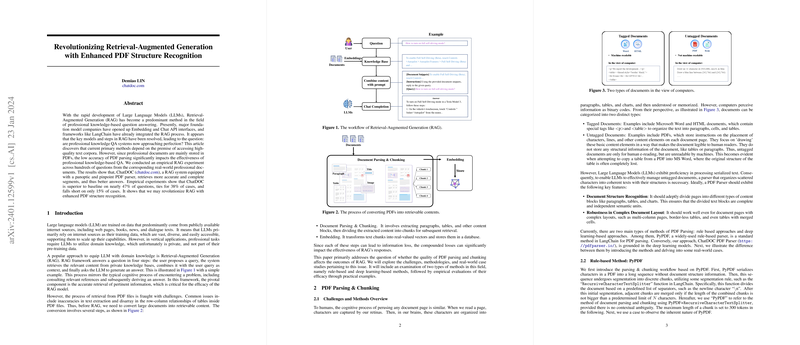Enhanced PDF Structure Recognition for RAG Systems
Introduction to RAG and PDF Parsing Challenges
Retrieval-Augmented Generation (RAG) has seen widespread adoption for professional knowledge-based applications, but its efficacy hinges on the quality of source document parsing. This paper focuses on the critical assessment of PDF parsing and chunking quality and its direct implication on RAG outcomes, particularly given that real-world professional documents are frequently stored in PDF formats. It outlines the typical workflow for RAG systems and the steps involved in converting PDFs into retrievable content blocks. These steps are crucial as they can impact the final quality of the responses generated by the RAG.
Rule-based vs. Deep Learning-based PDF Parsing
The paper contrasts two principal methods in PDF parsing—rule-based and deep learning-based approaches—and their respective shortcomings and advantages. It uses PyPDF, a widely-utilized rule-based parser, as the baseline in this comparison and introduces an alternative deep learning-based approach, the ChatDOC PDF Parser. The deep learning-based parser shows marked improvements in handling document layouts, table structure recognition, and maintaining reading order, which results in parsing PDFs into consistent and LLM-digestible formats. This sets up a critical understanding that capturing the fine structure of PDFs is immensely beneficial to RAG systems.
Impact Assessment on RAG through Empirical Experimentation
The paper presents a comparative analysis between the two parsing approaches by testing them within a RAG framework across a variety of questions. The empirical experiment with 302 questions showed that the ChatDOC system, incorporating enhanced PDF structure recognition, outperforms the baseline by significant margins on both extractive and comprehensive analysis questions. This section details dataset preparation, experiment settings, and evaluation methods. What stands out is not only the quantitative advantage of ChatDOC over the baseline but also the persuasive qualitative analysis through case studies.
Case Studies and Reflection on Limitations
Real-world cases are showcased where ChatDOC's parsing superiority is evident. Cases range from straightforward information retrieval from manuals to complex needs like recognizing and retrieving specific tables within research papers. While the results mostly lean towards the superiority of ChatDOC, the discussion also addresses certain limitations that the system encounters, such as ranking issues and segmentations that lead to incomplete information retrieval. Recommendations for future enhancements, such as improving table title recognition, are also suggested.
Applications and Conclusion
Finally, the paper underscores the integration of the improved PDF structure recognition within ChatDOC, an AI file-reading assistant, highlighting its application efficacy and reliable performance. Looking forward, the authors express their commitment to refine the comparison of parsing methods in order to better understand the interplay between RAG quality and document parsing quality. This work lays the groundwork for advancing RAG systems' precision and indicates that the frontier for such AI systems extends much further into the landscape of precise and context-aware retrieval.
